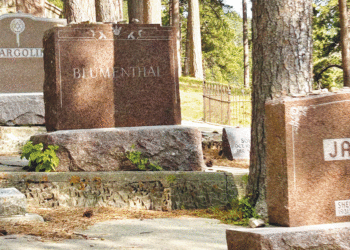I’m certain that Jewish World readers have been distressed by the upsurge in violence in Israel and the West Bank. As the Jewish World went to press this week, at least eight Israelis had been killed in random attacks, mainly stabbings perpetrated by Palestinian teenagers. On the flip side, Israeli police and civilians killed some 30 Palestinian attackers and West Bank protesters in the past two weeks.
The subhead of a Tuesday story on Ynet, the Web site of the Israeli daily Yediot Achronot, imparts a sense of the chaos in Israel: “Four Palestinian terrorists killed in four attacks in the West Bank; Israeli hit by truck and killed after stone attack, soldier and civilian lightly wounded in vehicular attack, Palestinian attacker shot while trying to stab soldier during riots.”
Writing recently for +972 Magazine, a left-wing Israeli blog in English, Mairav Zonszein noted: “The Palestinians going out to stab Israelis every day — many of them teenagers — are on veritable suicide missions. It’s like there’s a zombie movie happening on loop out there: people walking around with knives or sharp objects, using whatever they can muster to inflict harm and then poof, they disappear.”
The Israel Policy Forum hosted a teleconference last week with Israeli journalist Avi Issacharoff, former Arab affairs columnist for Haaretz and now a lecturer on Palestinian history at Ben-Gurion University, who provided his perspective on the gruesome uptick in violence.
While many commentators were wondering if the violent behavior added up to a third intifada, Palestinian uprising, Issacharoff said that, unlike the previous insurrections, “we don’t see tens of thousands in the streets. We don’t see hundreds of thousands in the streets like 1987. So it involves… young people, two or three a day, doing terror attacks… again and again and again. This is the new uprising that we see.”
Further, Issacharoff noted that “more than 85 percent” of the perpetrators “are coming from East Jerusalem. So even if you would go now and talk to Mahmoud Abbas, even if you go to negotiations, it doesn’t say that it’s going to affect the Palestinian youth that is living in East Jerusalem.”
Israel claims sovereignty over the mainly Arab or Palestinian communities of East Jerusalem, since 1967; and “Palestinian youth in Israel [don’t] like Mahmoud Abbas,” said Issacharoff. “They hate him. The things that I’ve been hearing about President Abbas in the last couple months are terrible. One is saying we need to bring him down. The other one is saying we need to shoot him. Simple as that.”
I listened in on the colloquy over the telephone, then about 50 minutes into the session my phone line was unmuted, and I asked Issacharoff a question: What’s the mood like in Jerusalem amid these attacks coming one after another? If I were in Jerusalem, could I travel around on the light rail, or what would I see today?
“I think you would see empty streets,” Issacharoff responded. “I think that the general atmosphere is that, don’t go out of the house, don’t go out and have fun… especially not in the Old City, because the Old City became a target, a real target. So you know I can only tell you about my family. My family is from Jerusalem. My parents don’t go out of the house in evening times. My sister, my niece, everyone is staying at home, simple as that… The feeling generally in Israel — not only in Jerusalem — is that we’re going through a very bad time, in which… you cannot really tell where and when the next terrorist attack is coming from.”
And Issacharoff added this: “I have a daughter who’s nine years old. She’s asking all these questions, ‘Daddy, is someone going to stab me? Is someone going to attack us?’ So suddenly it’s on the daily life… of each and every Israeli, that there is a possibility that something will happen to you.”
And I just will add that my editorials over many years have argued that the status quo in Israel, in East Jerusalem and in the West Bank, vis-à-vis the repression of the Palestinians, is a recipe for disaster. Even the present bleak situation, with stabbing and shooting attacks continuing apace, could become much worse.
I know that the many local Israeli foreign ministers reading this column have determined that Israel has no partner for peace on the Palestinian side, and they likely look at the current wave of nihilistic violence as substantiation for their viewpoint. However, Israel has decided to preside over East Jerusalem, the home to more than 300,000 Palestinian residents of Israel, and to maintain a military occupation of the West Bank that is now in its 49th year. We should not pretend that the daily humiliation and abuse of the Palestinians by the State of Israel will not have horrific consequences.
— Mordecai Specktor / editor [at] ajwnews [dot] com
(American Jewish World, 10.23.15)




















